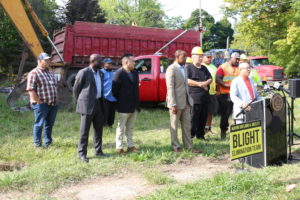The City of Flint is implementing a long-term plan to eliminate blight that includes funding from a variety of sources, a partnership with the Genesee County Land Bank, and contracts with blight removal service providers.
Today, the City begins clean-up of a blighted site near Rankin and Bonbright Streets, which has been targeted by illegal dumping. This is funded by a new $1 million grant from the State of Michigan for blight demolition. The grant provides funds for equipment, personnel, contracts, and other blight elimination activities. The City of Flint just received these funds and is implementing the grant at blighted sites around the city.
Mayor Neeley is asking for residents’ help to catch illegal dumpers in the city. Crime Stoppers continues to offer rewards of $250 to $1,000 for information that leads to the arrest of anyone illegally dumping in the City of Flint. Mayor Neeley hopes that residents will keep an eye out for illegal dumping, creating a deterrent to anyone who would consider polluting Flint’s neighborhoods with their trash. Residents can anonymously report blight to Crime Stoppers online at P3Tips.com/488 or by calling 1-800-422-JAIL(5245).
Another piece of the City’s blight plan involves funding from the American Rescue Plan Act (ARPA). The City of Flint has a strong partnership with the Genesee County Land Bank to use ARPA funding for demolition of blighted structures. The Land Bank has assembled a total of $43 million, including $16 million in City of Flint ARPA funds, which have been approved and allocated by City Council. This will fund demolition of 2,200 Land Bank properties.
“This demolition package represents the largest blight investment made to date in our city and county’s history,” Mayor Sheldon Neeley said. “I’m happy that the planning and partnership we’ve cultivated between the City of Flint and the Genesee County Land Bank will help keep residents safe and improve quality of life in our neighborhoods.”
This demolition package is part of a larger framework called Beyond Blight 2022, which was developed through a partnership among the City of Flint, the Genesee County Land Bank Authority, and the Flint Police Foundation. The C.S. Mott Foundation awarded funding to the Genesee County Land Bank to develop this plan through its Focus on Flint initiative. This strategic plan lays out strategies for tackling blight on a large-scale throughout the City of Flint. The plan can be viewed HERE.
In addition to the $16 million for demolition of condemned properties, the City of Flint administration has created the following blight mitigation initiatives as part of the city’s ARPA plan, pending approval by City Council. This plan was presented to the Flint City Council on June 14, 2022:
- City cleanup – $2,820,000: City clean-up projects would include weed and trash abatement; rodent abatement; cleaning vacant sites; purchasing equipment to make crews more efficient; expansion of illegal dumping surveillance cameras; planting alternative ground covering on vacant lots to reduce mowing costs; and hiring contractors to tackle backlogs caused by the pandemic.
- Grants for alternative uses of vacant lots – $500,000: This project involves re-granting for sustainable uses of vacant lots, such as urban farming, flower gardens, and rain gardens. Vacant lots are prevalent in Flint’s most distressed neighborhoods. Creative reuse of these lots can improve food access, reduce energy costs, and increase property values.
- Financial literacy training – $50,000: This program would help residents understand paths to home ownership and how to manage a home. Financial literacy training helps low- and moderate-income residents plan for home ownership and may reduce the racial wealth gap.
- Home repair & improvement grants – $2,000,000: This program would provide funding to community organizations that will aid residents in the restoration and rehabilitation of their homes. This program would improve housing conditions, health outcomes and mental health while decreasing the migration of people out of Flint. This would help increase property values and reduce health hazards for residents of distressed neighborhoods.
- Gap financing for residential and mixed-use projects – $3,400,000: Several proposed residential and mixed-use projects require gap financing to become a reality. This project would award gap financing grants on a competitive basis to proposals with the greatest potential to attract and retain residents. New residential and mixed-use projects will help Flint stabilize its population and grow its tax base while eliminating blight.
- Foreclosure avoidance – $1,000,000: This project would provide assistance with tax and insurance liabilities, which are not covered by other foreclosure avoidance programs. This fills a gap in foreclosure prevention programs to protect the most vulnerable homeowners from displacement.
- Tree hazard abatement – $100,000: This project would address the backlog of requests for removal of hazardous and downed trees from private property for owners who cannot afford commercial tree service. Funding will cover 40-150 properties, depending on size and complexity of jobs. This will improve living conditions and increase property values for residents in distressed neighborhoods.

Original source can be found here.

 Alerts Sign-up
Alerts Sign-up